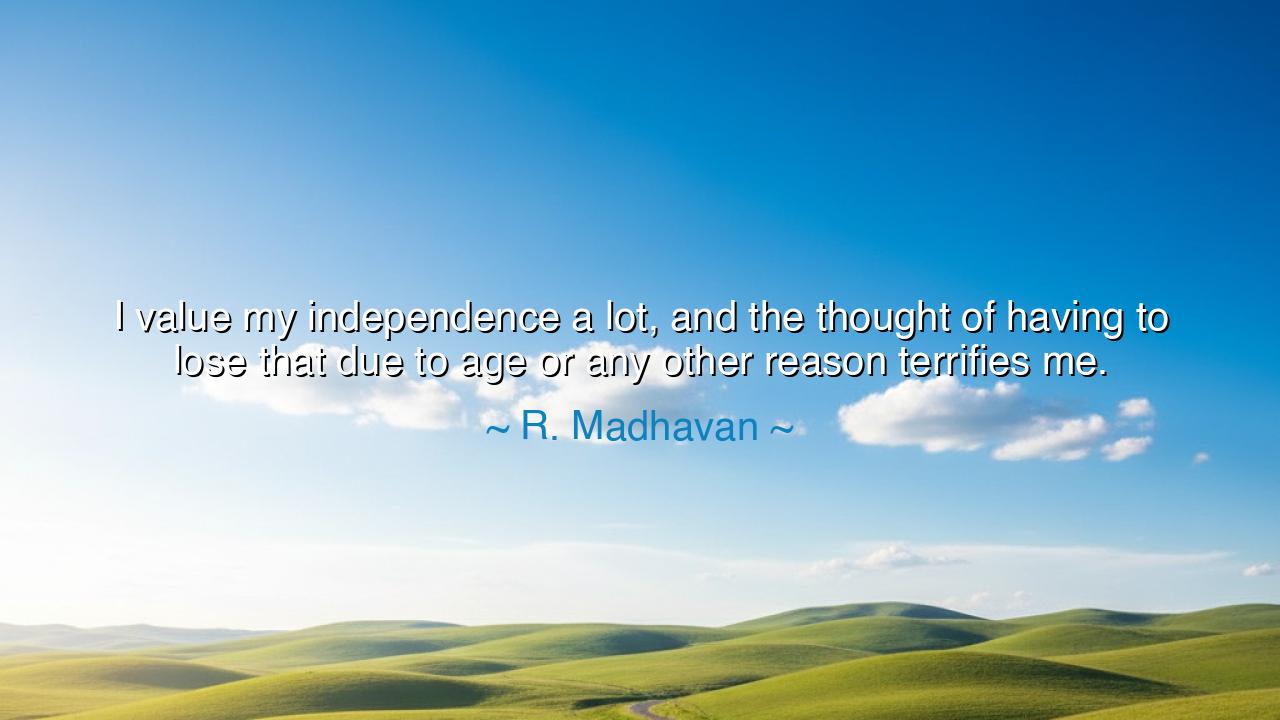
I value my independence a lot, and the thought of having to lose
I value my independence a lot, and the thought of having to lose that due to age or any other reason terrifies me.






The words of R. Madhavan are not merely an admission of fear; they are a meditation on what it means to live fully and freely. “I value my independence a lot, and the thought of having to lose that due to age or any other reason terrifies me.” Within this confession lies a truth as old as time — that independence is the flame that gives meaning to existence, and to lose it is to lose a part of one’s very soul. His words remind us that the human spirit was never born to be bound, and that freedom, once tasted, becomes as necessary as breath itself.
Since the dawn of civilization, the wise have spoken of autonomy as the highest form of dignity. Kings may wear crowns and warriors wield swords, but the greatest empire is the mastery of one’s own will. To act according to conscience, to choose one’s path, to rise and fall by one’s own strength — these are the hallmarks of a life truly lived. Yet as time passes, the body weakens while the mind still burns for freedom, and therein lies the anguish Madhavan reveals. His fear is not of death, but of dependence — of waking one day and finding that his choices no longer belong to him.
History has shown that this struggle for independence is not limited to nations or politics, but lives within every individual. Consider Helen Keller, who, though struck blind and deaf in childhood, refused to yield to helplessness. Through courage and learning, she transformed her limitations into triumphs, proving that true independence is not of the body, but of the soul. Her life, like Madhavan’s reflection, teaches us that while age or circumstance may rob us of strength, they cannot take from us the will to act, to think, to dream. As long as one’s heart dares to choose, one remains free.
And yet, Madhavan’s words also touch a deeper wound — the inevitability of change. The fear of losing independence is, in truth, the fear of losing control over one’s destiny. It is the fear that time, illness, or circumstance may reduce a once-sovereign self to dependence upon others. But the wise know that acceptance of change is itself a form of freedom. To age with grace is to see that independence does not end when the body yields — it transforms. It becomes the freedom of spirit, the serenity of mind, the independence of thought and gratitude.
There is a profound lesson here. The ancients taught that the measure of a person is not in how long they command power, but in how deeply they remain at peace when that power fades. True independence is not a possession that can be lost; it is a discipline cultivated through courage, self-respect, and humility. Even when the body falters, one can remain independent in wisdom, in love, and in faith. The stoic philosopher Epictetus, once a slave, found freedom not by escaping his chains, but by mastering his mind. He wrote, “No man is free who is not master of himself.” Thus, the independence that Madhavan values so dearly must be guarded not only by strength, but by understanding.
Still, his fear deserves compassion. It is the fear shared by all who have lived passionately and stood on their own feet — those who have earned their life through effort and integrity. To them, dependence feels like defeat. Yet, there is also honor in allowing others to serve with love. Just as a parent once guides a child, so too may a child guide a parent; in this exchange, interdependence reveals its quiet beauty. The loss of one kind of freedom may give birth to another — the freedom to trust, to receive, to be part of a greater whole.
Let this, then, be the wisdom drawn from his words: cherish independence, but do not cling to it as though it were the only form of life’s meaning. Build strength while you can, cultivate wisdom that will endure when strength is gone, and prepare your heart to embrace change without fear. Live with such purpose that even when time takes your body, your spirit remains unconquered. For true independence, as Madhavan’s reflection reveals, is not freedom from others — it is the freedom to remain yourself, unbroken, no matter what life demands.
Thus, to all who hear this teaching: walk fiercely while you can, stand tall in your choices, but learn also to bend with grace when the tide turns. For the soul that knows itself remains free even when the body cannot — and that is the independence that no age, no fate, no power can ever take away.






AAdministratorAdministrator
Welcome, honored guests. Please leave a comment, we will respond soon